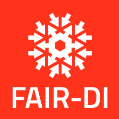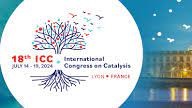The 18th International Congress on Catalysis will be held in Lyon, France, from July 14-19, 2024. As digitization has far-reaching implications for methodologies and workflows, also in catalysis research, a symposium will be dedicated to this topic and the need for FAIR data.
It will provide an opportunity to discuss the potential of digitalization in catalysis in all its aspects, including standardization of catalysis data, data sharing and curation, catalysis informatics, community-driven infrastructure, and digital research. The aim is to show a viable path for a digital transition for the community, both from an experimental and a theoretical perspective.
This time, Astrid Schneidewind (FZ Juelich, DAPHNE4NFDI) will talk about her academic career before we invite you to a discussion on individual and remarkable CVs.
Further information will soon be available on the Indico page: https://indico.desy.de/event/45519/
In this workshop, we would like to give you a short introduction to FAIR data structures. The want to present our finalization for a FAIR data standard for generic optical spectroscopy experiments and the respective specialization for ellipsometry. Via a tutorial it is presented, how NeXus files can be created and how these files can be checked, if they are compliant with the defined standard for ellipsometry. An follow-up discussion about concerns of the current standard or future ideas/wishes will be used to collect feedback for future updates.
In the last years we have developed a common, open and company-independent definition for the storage and exchange of raman spectroscopy data based on the FAIR principles. In this workshop, we want to introduce how this definition can be practically used for your data, i.e., how these files can be created and tested that they are compliant with the defined standard for Raman spectroscopy. A follow-up discussion about concerns of the current standard or future ideas/wishes will be used to collect feedback for upcoming updates or extensions.
We are excited to announce a dynamic event in Berlin: a three-day Hackathon focused on Materials Science simulations for methodologies going beyond DFT, taking place from September 4-6, 2024. This event provides a unique opportunity for researchers, students, and postdocs to delve into FAIR data management for their simulation codes, create tools for better management of inputs and outputs, and collaborate on improving the current data standard in a friendly environment.
Why participate?
- Overview of a very complex topic: Introductory talks in a variety of methods which go beyond DFT simulations: GW, TDDFT, BSE, DMFT, KKR, and electron-phonon coupling methodologies.
- Hands-on experience: Guidance from experts to create your own parsers or tools for your favorite simulation code, modify and adapt the data standard, and publish your work with the best practices in Data Management and Software Development.
- Collaborative environment: A lot of potential networking for future projects on databases, automation, high-throughput, machine-learning, etc.
- Publication opportunity: A future joint publication on a common data standard for these methodologies.
Places are limited, so do not miss this opportunity to be at the forefront of Materials Science and Data Management. We look forward to your participation in this exciting event!
Welcome to the FAIR-DI European Conference on Data Intelligence! The conference will take place in Karlsruhe, Germany, on October 27 - 30, 2024.
Join us in Oxford in September 2024 for this addition to our Faraday Discussion series. With over a century of history and more than 300 meetings, Faraday Discussions have been at the forefront of the physical sciences and many Discussions have become landmark meetings in their field.
Follow the link above for more information.






